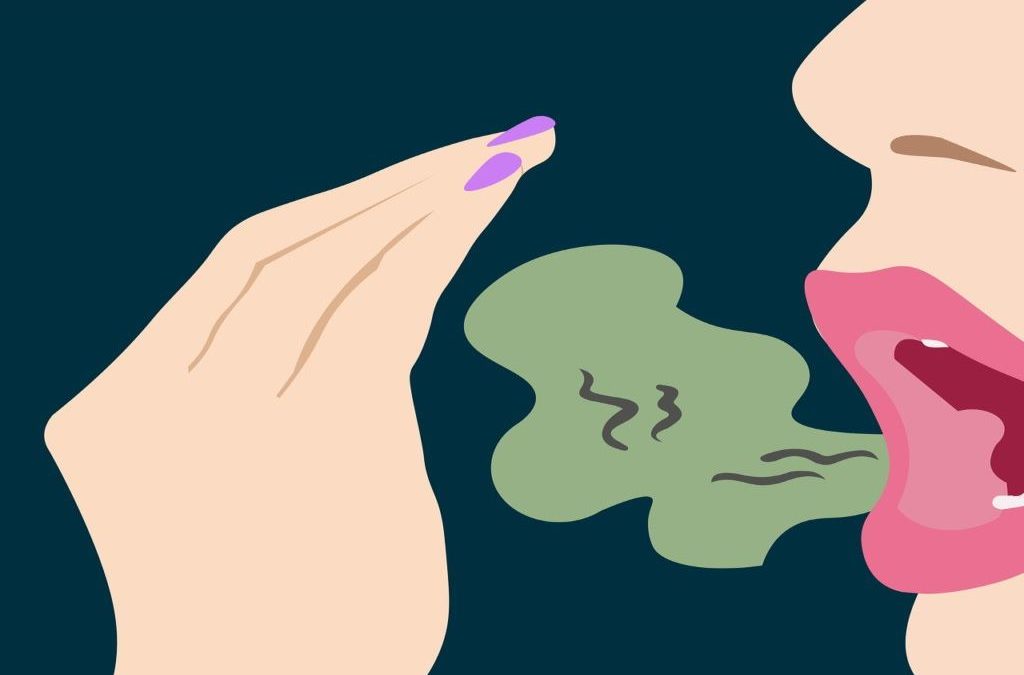Nobody likes having bad breath, whether that’s because you worry what your peers think or if the after taste of food from the day before is uncomfortable. Often though, the use of a mouth spray before every meeting or date won’t do the job:—it is just a short-term fix.
Bad breath – also known as halitosis – usually results from an accumulation of bacteria, so consistent bad breath can be a sign that something more serious is wrong. While we advise you to book an appointment with your dentist if you are having this problem, here are a few things that consistent bad breath could mean.
1. Poor Dental Hygiene
Poor dental hygiene is the most common cause of bad breath. As mentioned above, bad breath usually occurs when bacteria accumulate in your mouth, typically on the teeth and in debris that resides on the tongue. Failing to take good enough care of your teeth can cause these bacteria to build up in the form of plaque, which is a colourless, sticky film of bacteria that erodes tooth structure.
You need to brush plaque away; otherwise, it will irritate your gums and form pockets between your teeth and gums. This build-up leads to gum disease, and lingering plaque can also cause dental decay. Bad breath can be a sign of either of these two issues.
Gum disease will damage the gums and jawbone if allowed to continue untreated. These problems can vary in severity, from being generally reversible to needing more serious treatment, so make sure to talk to your dentist.
Brushing and flossing well can prevent bad breath and the issues signified by bad breath. Brushing and flossing remove small particles of food, which produce odour and bacteria if left to break down in your mouth.
Additionally, ill-fitting or unclean dentures can hold bad bacteria and food particles, so your dentist must assess them if you are experiencing bad breath.
Finally, although not strictly related to dental hygiene, halitosis can result from dental cavities and yeast infections in your mouth.
2. Dry Mouth
Dry mouth – the medical condition known as Xerostomia – is another major cause of bad breath, in which the salivary glands don’t produce enough saliva.
Saliva is critical for a wide variety of reasons, all of which can affect your breath. Saliva moistens and cleanses your mouth and neutralizes acids produced by plaque. Saliva removes odour-causing particles and washes away dead cells that accumulate throughout your mouth, on your gums, and your tongue.
If you have dry mouth, you are not producing enough saliva to clean your mouth and remove harmful particles. (Dry mouth naturally occurs when you are sleeping, hence why people have morning breath.) Dryness will mean that the dead cells will instead rot and decompose in your mouth.
Constant dry mouth can be a side effect of certain medications, or it may indicate salivary gland problems.
3. Mouth, Nose, and Throat Conditions
Small stones covered in bacteria can form at the back of your throat on your tonsils, and these bacteria can produce odour.
In other cases, bad breath can result from inflammation or infections in the sinuses, nose, or throat, such as sinusitis and bronchitis.
4. Diseases and Disorders
A variety of diseases and conditions can cause halitosis, owing to the range of chemicals they produce. Some cancers, liver failure, and metabolic disease can lead to distinctive bad breath because of the specific mix of chemicals.
Gastroesophageal reflux disease (GERD) can cause halitosis because of the regular backflow of stomach acids.
5. Ketoacidosis
If you have diabetes, constant halitosis may mean that your insulin levels are very low; your body is no longer using sugar and has begun breaking down stores of fat instead.
This process produces ketones, which are poisonous in large numbers and create a particularly unpleasant form of halitosis. The condition can be life-threatening, so seek medical attention as soon as possible.
Need to Eliminate Bad Breath?
If you have persistent bad breath, schedule an appointment with Dentrix Dental today. Together, we’ll find the right solution for you.

